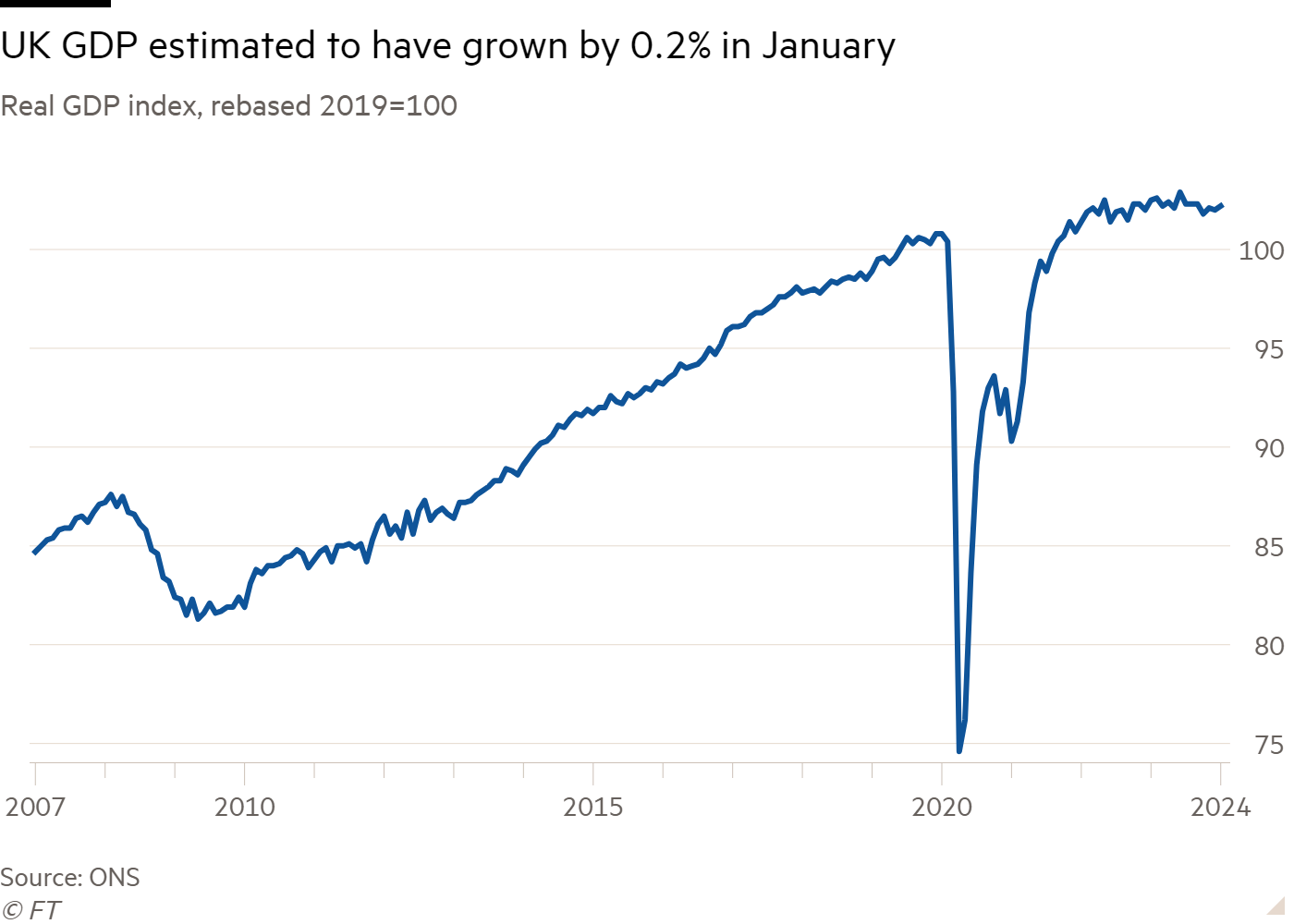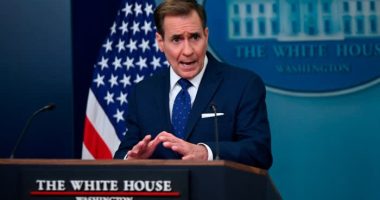Unlock the Editor’s Digest for free
Roula Khalaf, Editor of the FT, selects her favourite stories in this weekly newsletter.
The UK economy returned to growth in January helped by the expansion of the services sector, following a technical recession in the second half of 2023.
Gross domestic product rose 0.2 per cent between December 2023 and January, driven by 0.2 per cent expansion in the services sector, the Office for National Statistics said on Wednesday.
This was in line with analysts’ expectations and followed two consecutive quarters of economic contractions in the second half of 2023, which marked a technical recession. The economy also shrank 0.1 per cent month-on-month in December.

The markets shrugged off the news, with sterling edging down 0.12 per cent against the dollar to $1.2777. Traders slightly increased their bets on interest rate cuts from the Bank of England this year; the market-implied probability of the first rate cut by June rose from under 60 per cent to 65 per cent.
January’s GDP growth raises expectations of the UK economy expanding in the first quarter — this would bring the recession to an end and lift a political millstone from around the neck of Rishi Sunak’s government.
Ruth Gregory, economist at Capital Economics, said the figures suggested “the UK economy may already have moved out of recession . . . with the timelier data suggesting the economy has turned a corner”. She forecasted that the economy would expand by 0.1 per cent in the first quarter, in line with the BoE.
January’s expansion was good news for the Conservative party as it trails behind Labour by 20 points in the opinion polls. The economy fell into a recession in the second half of 2023, in a blow to Sunak’s pledge to “grow the economy”.
Chancellor Jeremy Hunt said: “While the last few years have been tough, today’s numbers show we are making progress in growing the economy — part of which makes it possible to bring down national insurance contributions by £900 this coming year.”
However, Rachel Reeves, shadow chancellor, responded that Sunak’s claims that his plan was working was in “tatters” and that “after 14 years of economic decline under the Conservatives, Britain is worse off”.
Despite the monthly growth, the economy remained fragile. Output was 0.3 per cent below January 2023, reflecting the impact of elevated borrowing costs and the ongoing cost of living crisis. In the three months to January, output was down 0.1 per cent compared with the previous three months.
On Tuesday, separate official data showed that wage growth continued to slow in the three months to January, consolidating expectations that the BoE will start cutting interest rates from their 16-year high of 5.25 per cent by the middle of this year.
Commenting on the GDP figures for January, Liz McKeown, ONS director of economics statistics, said: “The economy picked up in January with strong growth in retail and wholesaling. Construction also performed well with housebuilders having a good month, having been subdued for much of the last year.”
The ONS said that some industries have experienced disruptions to their supply chains due to issues in the Red Sea region, while industrial action continued to hit output in the health sector, transport and film production.

The ONS reported the private sector drove a rise in health output. It also showed that output in the hospitality sector shrank by 0.6 per cent, reversing the expansion in December and pointing to a quiet start of the year. Mining and quarrying output fell by 1.3 per cent in January and was 19.3 per cent below its level in January 2022, reflecting the decline in the extraction of crude petroleum and natural gas.
Many economists expect that rising wages, easing inflation and lower borrowing costs will help the economy pick up pace this year. Earlier in March, the Office for Budget Responsibility, the UK fiscal watchdog, forecast the economy would grow 0.8 per cent in 2024.
Sanjay Raja, economist at Deutsche Bank, said: “The technical recession that the UK slipped into late last year will be shortlived and we should see growth gradually return to its trend rate over the course of the year, as sentiment continues its uptrend and fiscal and monetary policy loosen through 2024.”
Read More: World News | Entertainment News | Celeb News
FT










